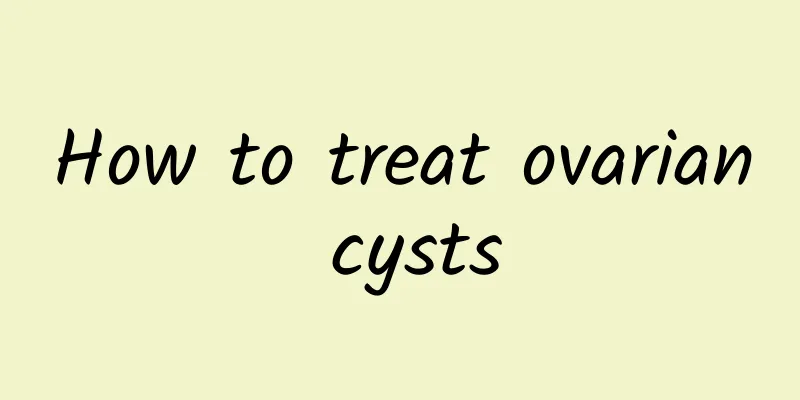How to treat ovarian cysts

|
What are the treatments for ovarian cysts? What treatments do you know about ovarian cysts? Ovarian cysts are a common gynecological disease, which seriously endangers people's health. So what are the treatments for ovarian cysts? In response to this question, we ask experts to introduce the treatments for ovarian cysts in detail. Treatments for ovarian cysts include: First, drug treatment: When a mixed mass is diagnosed in the ovary, conservative treatment can be given for one to two courses depending on the situation, and then the B-ultrasound can be repeated. If the mass has shrunk, surgery is not necessary. If there is no change or even growth, surgery is necessary. This is the treatment method for ovarian cysts. Second point, Chinese medicine treatment: At present, Chinese medicine treatment of ovarian cysts has achieved certain breakthroughs. Most common fluid cysts below 9CM can be cured in just one month, and chocolate ovarian cysts can be cured in about three months. This is one of the treatment methods for ovarian cysts! Soothe the liver and regulate qi, activate blood circulation and remove blood stasis, warm and unblock the hardness, strengthen the body and consolidate the foundation, and completely cure ovarian cysts. Comprehensively regulate the endocrine system to activate qi and blood, activate the internal organs, meridians are the basis, qi and blood are the function, qi and blood are the material basis of the body, and the internal organs are the source of qi and blood biochemistry, which play the role of managing blood generation, controlling, running and regulating qi and blood balance. Qi is the driving force of blood, which is also one of the treatment methods for ovarian cysts. Third, the treatment of ovarian cysts: surgical treatment includes salpingo-oophorectomy on the affected side; bilateral ovarian cystectomy; adnexectomy and total hysterectomy. At present, the treatment of ovarian cysts at home and abroad mostly adopts surgery, chemotherapy, radiotherapy, etc., but most of them are difficult to cure. Malignant tumors have a short course and develop rapidly. Depending on the degree of malignancy, the amount of surgical resection or the sensitivity of radiotherapy and chemotherapy, the recurrence may be early or late. After surgery, the tumor will recur and grow again. Therefore, most patients will still relapse after surgery. |
<<: Do you know what symptoms of ovarian cysts are?
>>: The harm of long-term untreated irregular menstruation
Recommend
Five common vulvar leukoplakia care points
Vulvar leukoplakia is a gynecological disease tha...
Eat pasta without worries! Nutritionists teach you 3 secrets to not getting fat
Whether it is a weekday dinner, a gathering with ...
Progress in research on diagnosis of hyperprolactinemia
In real life, many women suffer from hyperprolact...
What are the treatments for vulvar leukoplakia?
What treatments do you know about vulvar leukopla...
How to treat uterine effusion?
How to treat uterine effusion? This is probably a...
What are the symptoms of uterine fibroids? Is increased vaginal discharge a manifestation of uterine fibroids?
There are also many symptoms of uterine fibroids....
How to treat early cervical erosion in women? It is recommended to treat early cervical erosion in women in this way
Women's gynecological diseases are very compl...
Say goodbye to trans fats and put calorie counts on chain stores
It is the last month of the year again. December ...
What should I do if my period hasn’t come yet?
What should I do if my period hasn’t come yet? Th...
What to do if a woman has cervical erosion during pregnancy? Five health care principles for cervical erosion during pregnancy
Some women with cervical erosion must pay more at...
Is Type IV intestinal atresia serious?
Type IV intestinal atresia is a severe congenital...
The cause of frequent dysmenorrhea in women is related to endocrine factors
For female friends, frequent dysmenorrhea is not ...
"Pressing the instep" can slim your calves! Xiaohongshu's popular slimming training, you can get straight and slender fairy legs in just one month
If you want a pair of straight and slender fairy ...
Edema, high body fat or poor metabolism? Top 5 obesity types identified by Chinese medicine practitioners!
There are 5 types of fat people, which one are yo...
The most advanced method for diagnosing threatened miscarriage
In today's society, women are experiencing th...









